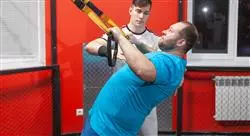University certificate
Scientific endorser

The world's largest faculty of sports science”
Why study at TECH?
Gain advanced knowledge in the most specific exercises for people with obesity and diabetes so you can help these people improve their health"
The Postgraduate diploma in Physical Exercise in Obesity, Metabolic Syndrome and Diabetes has been designed to specialize the personal trainer in the care and work with users with these pathologies, so that they can perform specific activities to help them improve their health. In this way, the program will present all the criteria, based on evidence, that should serve to make operational decisions regarding the design of exercise programs and, in this way, to design individualized training programs for each subject and their pathology, whether obesity or diabetes.
It should be taken into account that obesity has become one of the most frequent diseases in the world, although the most underestimated of all, being perceived by the population as a simple aesthetic problem. A sedentary lifestyle and an excessive and inadequate diet are two of the elements with the greatest impact on the development of this disease. However, the simplistic belief that an increase in physical activity and a decrease in intake is sufficient for its treatment has been seen as an ineffective treatment, given that the system in this pathological state does not respond in the same way. Therefore, in this Postgraduate Diploma, special emphasis will be placed on the planning and programming of training adjusted to the dysfunctionality of these individuals in order to generate perceptible changes in their health.
Although there is no single definition of metabolic syndrome, most international institutions define it as a disorder in which obesity, altered glucose levels, dyslipidemia and/or hypertension coexist. This scenario places us before a patient with an alteration at different levels that constitutes a health problem of the first order.
Diabetes Mellitus is a metabolic disorder that causes hyperglycemia, due to the impossibility of the pancreas to secrete insulin or due to a defective action of insulin for various reasons. There are different types of Diabetes, the most frequent or known being Type I Diabetes and Type II Diabetes. In both cases, lifestyle is of great importance and should be adjusted to the specific needs of the disease, both from a nutritional and physical exercise point of view, which has been shown to be a very important tool as part of the treatment of diabetes, as long as it is carried out in an appropriate manner and knowing the difficulties and risks involved in the presence of hypo- and hyperglycemia.
In order to get qualified in this field, TECH has designed this Postgraduate Diploma, which has contents of the highest teaching and educational quality, which aims to turn students into successful professionals, following the highest quality standards in teaching at international level. In addition, as it is an online Postgraduate diploma, the student is not constrained by fixed schedules or the need to move to another physical location, but can access the contents at any time of the day, balancing their professional or personal life with their academic life as they wish.
Immerse yourself in the study of this high-level Postgraduate diploma and improve your skills as a personal trainer"
This Postgraduate diploma in Physical Exercise in Obesity, Metabolic Syndrome and Diabetes contains the most complete and up-to-date scientific program on the market. The most important features of the program include:
- The development of numerous case studies presented by specialists in personal training
- The graphic, schematic, and eminently practical contents with which they are created contain information that is indispensable for professional practice
- It contains exercises where the self-assessment process can be carried out to improve learning
- Algorithm-based interactive learning system for decision-making
- Special emphasis on innovative methodologies in personal training
- Theoretical lessons, questions to the expert, debate forums on controversial topics, and individual reflection assignments
- Content that is accessible from any fixed or portable device with an Internet connection
This Postgraduate diploma is the best investment you can make when choosing a refresher program for two reasons: in addition to updating your knowledge as a personal trainer you will obtain a certificate from the world's largest online university: TECH”
The teaching staff includes professionals from the field of sports science, who bring their experience to this training program, as well as renowned specialists from leading societies and prestigious universities.
The multimedia content, developed with the latest educational technology, will provide the professional with situated and contextual learning, i.e., a simulated environment that will provide immersive training programmed to train in real situations.
This program is designed around Problem-Based Learning, whereby the professional must try to solve the different professional practice situations that arise during the academic year. For this purpose, the professional will be assisted by an innovative interactive video system developed by recognized experts in the design of exercise programs for people with obesity, metabolic syndrome and diabetes, and with great experience.
This Postgraduate Diploma offers practice in simulated environments, which provides an immersive learning experience designed to prepare for real-life situations"
This 100% online Postgraduate diploma will allow you to balance your studies with your professional work while increasing your knowledge in this field"
Syllabus
The structure of the contents has been designed by a team of professionals knowledgeable about the implications of daily practice, aware of the current relevance of quality training in the field of personal training; and committed to quality teaching through new educational technologies.
We have the most complete and up-to-date scientific program on the market. We want to provide you with the best specialization"
Module 1. Obesity and Physical Exercise
1.1. Definition, Contextualization and Epidemiology
1.1.1. Evolution of Obesity: Associated Cultural and Social Aspects
1.1.2. Obesity and Comorbidities: The Role of Interdisciplinarity
1.1.3. Childhood Obesity and Its Impact on Future Adults
1.2. Pathophysiological Bases
1.2.1. Definition of Obesity and Health Risks
1.2.2. Pathophysiological Aspects of Obesity
1.2.3. Obesity and Associated Pathologies
1.3. Evaluation and Diagnosis
1.3.1. Body Composition: 2-Component and 5-Component Model
1.3.2. Evaluation: Main Morphological Evaluations
1.3.3. Interpretation of Anthropometric Data
1.3.4. Prescription of Physical Exercise for the Prevention and Improvement of Obesity
1.4. Protocols and Treatment
1.4.1. First Therapeutic Guideline: Lifestyle Modification
1.4.2. Nutrition: Role in Obesity
1.4.3. Exercise: Role in Obesity
1.4.4. Medical Treatment
1.5. Training Planning in Patients with Obesity
1.5.1. Definition and Specification of Customer Level
1.5.2. Definition and Specification of Objectives
1.5.3. Definition and Specification of Evaluation Processes
1.5.4. Definition and Specification of Operability with Respect to Spatial and Material Resources
1.6. Programming of Strength Training in Obese Patients
1.6.1. Objectives of Strength Training in Obese People
1.6.2. Volume, Intensity and Recovery of Strength Training in Obese Individuals
1.6.3. Selection of Exercises and Methods of Strength Training in Obese People
1.6.4. Design of Strength Training Programs in Obese People
1.7. Programming of Resistance Training in the Obese Patient
1.7.1. Objectives of Resistance Training in Obese People
1.7.2. Volume, Intensity and Recovery of Resistance Training in Obese People
1.7.3. Selection of Exercises and Methods of Resistance Training in Obese People
1.7.4. Design of Resistance Training Programs in Obese People
1.8. Joint Health and Complementary Training in Obese Patients
1.8.1. Complementary Training in Obesity
1.8.2. WMD/Flexibility Training in Obese People
1.8.3. Improved Trunk Control and Stability in Obese People
1.8.4. Other Training Considerations for the Obese Population
1.9. Psycho-Social Aspects of Obesity
1.9.1. Importance of Interdisciplinary Treatment in Obesity
1.9.2. Eating Disorders
1.9.3. Childhood Obesity
1.9.4. Adult Obesity
1.10. Nutrition and Other Factors Related to Obesity
1.10.1. Omic Sciences and Obesity
1.10.2. Microbiota and Its Influence on Obesity
1.10.3. Protocols for Nutritional Intervention in Obesity: Evidence
1.10.4. Nutritional Recommendations for Physical Exercise
Module 2. Diabetes and Physical Exercise
2.1. Definition, Contextualization and Epidemiology
2.1.1. Definition and Basic of Diabetes Mellitus
2.1.2. Signs and Symptoms of Diabetes Mellitus
2.1.3. Definition and Classification of Diabetes Mellitus
2.1.4. Type II Diabetes and Lifestyle
2.2. Pathophysiological Bases
2.2.1. Anatomo-Physiological Bases
2.2.2. The Pancreas and the Regulation of Glycemia
2.2.3. Macronutrient Metabolism in Diabetes Mellitus
2.2.4. Insulin Resistance
2.3. Evaluation and Diagnosis
2.3.1. Diabetes: Assessment in the Clinical Setting
2.3.2. Diabetes Mellitus Complications
2.3.3. Diabetes: Its Evaluation and Follow-Up by the Physical Exercise Specialist
2.3.4. Diabetes Diagnosis and Intervention Protocol
2.4. Protocols and Treatment
2.4.1. Glycemic Control and Nutritional Aspects
2.4.2. Treatment of Diabetes Mellitus Type 1 and 2
2.4.3. Pharmacological Treatment. Basic Aspects to Consider
2.4.4. Non-Pharmacological Treatment by Physical Exercise: Role in Diabetes
2.5. Training Planning in Patients with Diabetes
2.5.1. Definition and Specification of Customer Level
2.5.2. Definition and Specification of Objectives
2.5.3. Definition and Specification of Evaluation Processes
2.5.4. Definition and Specification of Operability with Respect to Spatial and Material Resources
2.6. Programming of Strength Training
2.6.1. Objectives of Strength Training in Diabetes
2.6.2. Volume, Intensity and Recovery of Strength Training in Diabetes
2.6.3. Selection of Exercises and Methods of Strength Training in Diabetes
2.6.4. Design of Strength Training Programs in Diabetes
2.7. Programming of Resistance Training
2.7.1. Objectives of Resistance Training in Diabetes
2.7.2. Volume, Intensity and Recovery of Resistance Training in Diabetes
2.7.3. Selection of Exercises and Methods of Resistance Training in Diabetes
2.7.4. Design of Resistance Training Programs in Diabetes
2.8. Precautions and Contraindications
2.8.1. Blood Glucose Values and Physical Exercise
2.8.2. Contraindications in the Development of Activity in Patients with Diabetes Mellitus Type I
2.8.3. Attention to Problems Related to Diabetes and Physical Exercise
2.8.4. Safety and First Aid in Complications during the Development of Physical Exercise Programs in Diabetics
2.9. Nutrition and Lifestyle in Diabetic Patients
2.9.1. Nutritional Aspects of Diabetes
2.9.2. Metabolic Control and Glycemic Index
2.9.3. Nutritional Recommendations for Physical Exercise
2.10. Design of Training Programs for Diabetic Patients
2.10.1. Design of Resistance Training Programs in Diabetes
2.10.2. Design of Resistance Training Session in Diabetes
2.10.3. Design of Global Intervention Programs (Inter-multidisciplinary) in Diabetes
2.10.4. Final Conclusions and Closing of the Module
Module 3. Metabolic Syndrome and Physical Exercise
3.1. Definition, Contextualization and Epidemiology
3.1.1. Definition of Metabolic Syndrome
3.1.2. Epidemiology of Metabolic Syndrome
3.1.3. The Patient with Syndrome, Considerations for Intervention
3.2. Pathophysiological Bases
3.2.1. Definition of Metabolic Syndrome and Health Risks
3.2.2. Pathophysiological Aspects of the Disease
3.3. Evaluation and Diagnosis
3.3.1. Metabolic Syndrome and Its Assessment in the Clinical Setting
3.3.2. Biomarkers, Clinical Indicators and Metabolic Syndrome
3.3.3. Metabolic Syndrome and Its Assessment and Follow-up by the Physical Exercise Specialist
3.3.4. Diagnosis and Intervention Protocol in Metabolic Syndrome
3.4. Protocols and Treatment
3.4.1. Lifestyle and Its Relationship to Metabolic Syndrome
3.4.2. Exercise: Role in the Metabolic Syndrome
3.4.3. The Metabolic Syndrome Patient and Pharmacological Treatment: Considerations for the Exercise Professional
3.5. Training Planning in Patients with Metabolic Syndrome
3.5.1. Definition and Specification of Customer Level
3.5.2. Definition and Specification of Objectives
3.5.3. Definition and Specification of Evaluation Processes
3.5.4. Definition and Specification of Operability with Respect to Spatial and Material Resources
3.6. Programming of Strength Training
3.6.1. Objectives of Strength Training in Metabolic Syndrome
3.6.2. Volume, Intensity and Recovery of Strength Training in Metabolic Syndrome
3.6.3. Selection of Exercises and Methods of Strength Training in Metabolic Syndrome
3.6.4. Design of Strength Training Programs in Metabolic Syndrome
3.7. Programming of Resistance Training
3.7.1. Objectives of Strength Training in Metabolic Syndrome
3.7.2. Volume, Intensity and Recovery of Resistance Training in Metabolic Syndrome
3.7.3. Selection of Exercises and Methods of Resistance Training in Metabolic Syndrome
3.7.4. Design of Resistance Training Programs in Metabolic Syndrome
3.8. Precautions and Contraindications
3.8.1. Assessments for Physical Exercise in the Population with Metabolic Syndrome
3.8.2. Contraindications in the Development of Activity in Patients with Metabolic Syndrome
3.9. Nutrition and Lifestyle in Patients with Metabolic Syndrome
3.9.1. Nutritional Aspects in Metabolic Syndrome
3.9.2. Examples of Nutritional Intervention in Metabolic Syndrome
3.9.3. Nutritional Recommendations for Physical Exercise
3.10. Design of Training Programs in Patients with Metabolic Syndrome
3.10.1. Design of Training Programs in Metabolic Syndrome
3.10.2. Design of Training Sessions in Metabolic Syndrome
3.10.3. Design of Global Intervention Programs (Inter-multidisciplinary) in Metabolic Syndrome
3.10.4. Final Conclusions and Closing of the Module
A unique, key and decisive specialization experience to boost your professional development"
Postgraduate Diploma in Physical Exercise in Obesity, Metabolic Syndrome, Diabetes
Sedentary lifestyle is one of the main risk factors in the development of chronic diseases such as obesity, metabolic syndrome or diabetes. Therefore, the role of physical exercise becomes essential in the prevention and treatment of these pathologies. This Postgraduate Diploma in Physical Exercise in Obesity, Metabolic Syndrome and Diabetes is the program you need to specialize in this field. In this study program, the student will learn to design and prescribe physical training programs adapted to the specific needs of each patient, taking into account their state of health and physical condition. Through a theoretical-practical methodology, the student will acquire knowledge about exercise physiology, sports nutrition, fitness assessment, planning and design of training programs, among others. This program has experts in the area who are in charge of transmitting the most up-to-date and relevant knowledge for professional practice. The objective is that the student is qualified to carry out an effective, safe and personalized intervention in the prevention and treatment of these pathologies.
In-depth study of the different metabolic pathologies
This Postgraduate Diploma in Physical Exercise in Obesity, Metabolic Syndrome and Diabetes is a 100% online program, which allows greater time flexibility and adaptation to the needs of the student. In addition, it has a wide range of resources and multimedia tools that facilitate learning and monitoring of the program. With this training, the student will be prepared to specialize in the field of physical exercise in pathologies such as obesity, metabolic syndrome or diabetes, and thus contribute to improving the quality of life of people affected by these diseases.











